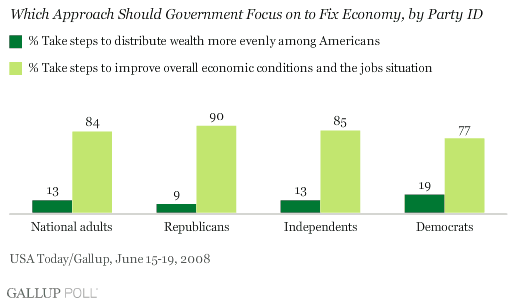Toro
Diamond Member
What Europeans, Australians and Canadians don't understand about America. Well, at least one thing.
Most people from the industrialized world expect that when economic conditions turn poor for either the individual or the economy as a whole, the government should create or increase social spending programs. Not Americans. Rather than focusing on redistribution, Americans want their governments to focus on create the conditions for the situation to improve.
Americans Oppose Income Redistribution to Fix Economy
Most people from the industrialized world expect that when economic conditions turn poor for either the individual or the economy as a whole, the government should create or increase social spending programs. Not Americans. Rather than focusing on redistribution, Americans want their governments to focus on create the conditions for the situation to improve.
When given a choice about how government should address the numerous economic difficulties facing today's consumer, Americans overwhelmingly -- by 84% to 13% -- prefer that the government focus on improving overall economic conditions and the jobs situation in the United States as opposed to taking steps to distribute wealth more evenly among Americans.

...
A separate question finds Americans more likely to believe government is doing too many things that should be left to individuals and businesses (50%) as opposed to saying government should do more to solve the country's problems (43%). This broad question is not directed specifically at the economy, but reinforces the general idea that many Americans are leery of too much direct government intervention in fixing the country's problems.
,,,
In sum, free-market advocates can take considerable solace in Americans' overwhelming belief that the government should not focus on redistributing income and wealth, but on improving the overall economy. And, to a lesser degree, Americans also believe government continues to do too much -- not too little -- to solve the nation's problems. On the other hand, the economic turbulence of 2008 could end up getting government into significant new income and wealth redistribution programs unless the Treasury and the Federal Reserve act soon to stabilize and reduce today's unmanageable food and energy price increases.
Americans Oppose Income Redistribution to Fix Economy
